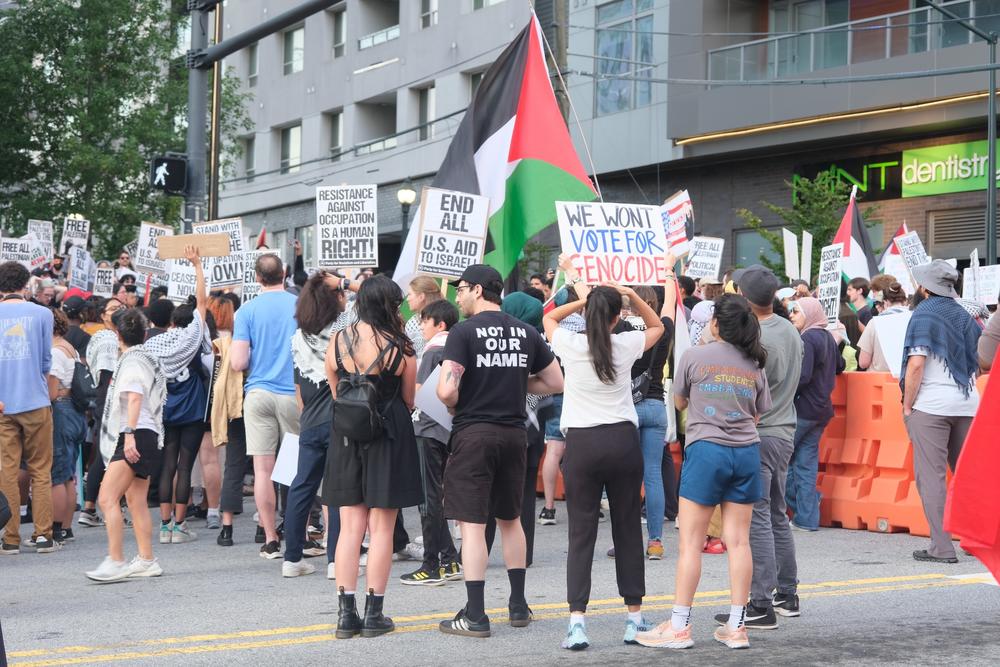
Section Branding
Header Content
Georgia Today: Pres. debate reactions; Savannah to demolish arena; Weekend art exhibitions in ATL
Primary Content
LISTEN: On the Friday, June 28 edition of Georgia Today: We'll learn more about what Georgians wanted from last night's presidential debate; Savannah city council members vote to demolish a 10,000-seat arena; and we'll tell you about several art exhibitions on view in Atlanta this week.

Peter Biello: Welcome to the Georgia Today podcast from GPB News. Today is Friday, June 28. I'm Peter Biello. On today's episode, we'll learn more about what Georgians wanted from last night's presidential debate. Savannah City Council members vote to demolish a 10,000-seat arena, and we'll tell you about several art exhibitions on view in Atlanta this week. These stories and more are coming up on this edition of Georgia Today.
Story 1:
Peter Biello: President Joe Biden and former President Donald Trump faced off in Atlanta last night in the first debate of the 2024 election. GPB's Sarah Kallis reports, reviews of both candidates were mixed.
Sarah Kallis: Border security, inflation and foreign wars were all major themes throughout the debate. Trump and Biden spent much of their time attacking each other on their respective records, as President Trump claimed that the country is overall worse off than when he was in office.
Donald Trump: What this man has done is absolutely criminal.
Sarah Kallis: Biden said that Trump lied in his answers during the debate.
Joe Biden: Every single thing he said is a lie. Every single one.
Sarah Kallis: Critics say Biden's hoarse voice did not help make the case that he isn't too old to run. Meanwhile, Trump refused to say he would accept the results of the election. The next debate is scheduled for Sept. 10. For GPB News, I'm Sarah Kallis in Atlanta.

Story 2:
Peter Biello: Ahead of the presidential debate in Atlanta last night, hundreds of protesters gathered in Midtown. GPB's Amanda Andrews reports.
Amanda Andrews: Several different political groups gathered in a unified show of support for Palestinians. Others rally to bring attention to issues of animal rights, deaths from opioid misuse, and support for third-party presidential candidates. Georgia resident Jena Williams says the war in Gaza is the top political issue for them as a Palestinian.
Jena Williams: Social justice matters. But for this — for this election upcoming, Palestine is top of mind because that's where I draw the — I mean, that's the red line for me, is I'm not voting for a president who is supporting genocide.
Amanda Andrews: Many rally attendees voiced a disinterest in voting for either candidate. The rally was largely peaceful and included very few counter-protesters. For GPB News, I'm Amanda Andrews.
Story 3:
Peter Biello: After the debate, both candidates headed off to campaign events. Biden first stopped by the Georgia Democratic Party's debate watch party at the Hyatt Regency in downtown Atlanta. Then he picked up a to go order at the Waffle House in Cobb County before leaving on Air Force One. Meanwhile, Trump attended a high-dollar fundraiser in Atlanta hosted by former U.S. Sen. Kelly Loeffler.
Story 4:
Peter Biello: Savannah will demolish its roughly 10,000-seat downtown arena. The city council's decision yesterday settles long running questions about the future of the city-owned Martin Luther King Jr Arena and what's around it. GPB's Benjamin Payne reports.
Benjamin Payne: Even before Savannah's own Enmarket Arena opened two years ago, the 50-year-old MLK Arena had fallen into a state of disrepair owing to years of deferred maintenance. But now, council members appear to be done kicking the can. By a 7 to 1 vote, city council agreed to remove the MLK Arena, while also giving the go-ahead for major renovations at the Johnny Mercer Theatre next door. Savannah Mayor Van Johnson:
Van Johnson: This is an opportunity for us to really strike a very good balance between our current uses and even our future uses, while honoring our historic past.
Benjamin Payne: To that end, the resolution directs the city manager to restore as much of the Oglethorpe Plan as possible. It's Savannah's signature urban design, laid out by British colonist James Oglethorpe, which is centered around town squares. For GPB News, I'm Benjamin Payne in Savannah.
Story 5:
Peter Biello: The head of the Federal Reserve Bank of Atlanta remains, quote, "quite optimistic" that things are headed in the right direction. In a video promoting his quarterly message released yesterday, Raphael Bostic offered renewed hope on inflation while saying more confidence is needed.
Raphael Bostic: I believe inflation is likely to continue its fall, albeit quite slowly, toward our inflation target. The labor market, job creation in particular, has continued to be strong, and there are signs that this can continue. I still believe that being patient and vigilant will be the best approach to policymaking over the next several months.
Peter Biello: Bostic sits on the Federal Open Market Committee, the nation's monetary policymaking body.

Story 6:
Peter Biello: The U.S. Soccer Federation says Tim Weah and other members of the U.S. men's national team were targets of racial abuse on social media after the Americans were beaten 2 to 1 by Panama in a Copa America match in Atlanta last night. The Federation CEO, J.T. Batson, condemned the comments.
J.T. Batson: There is no place in sports or in society for racism in any form. We absolutely condemn that. It's awful and we support our players, we support our team and we stand firm against racism.
Peter Biello: Weah, who is Black, was sent off with a red card after punching a Panama player. The U.S. loss puts the team in danger of failing to advance past the first round of their biggest test ahead of the 2026 World Cup.
Story 7:
Peter Biello: In a long-awaited opinion handed down today, the US Supreme Court found that fining or even jailing homeless people for camping in public spaces are permissible penalties under the Constitution. GPB's Grant Blankenship reports.
Grant Blankenship: The case Johnson v. Grants Pass originated in a small town in Oregon. Their city leaders had imposed police-enforced fines for camping in public spaces despite the fact the city had no shelter beds as an alternative. Writing for the majority, Justice Neil Gorsuch rejected claims that such penalties amounted to cruel and unusual punishment under the Eighth Amendment to the Constitution, opening the door to similar policies across the country. Jake Hall leads the nonprofit coalition United to End Homelessness in Macon. He sees the decision as reflective of the challenge to balance charity against community space.
Jake Hall: I cannot support criminalizing homelessness without providing services. That certainly seems both cruel and unusual.
Grant Blankenship: Hall says, even so, the first meeting between the government and the homeless should not include a badge and a gun. For GPB News, I'm Grant Blankenship in Macon.
Story 8:
Peter Biello: A federal court opinion issued today has important implications for the long-term storage in Georgia of the millions of tons of toxic material left from burning coal to make electricity: so-called coal ash. In the case Electric Energy Inc. v. the Environmental Protection Agency, utilities around the country, but excluding Georgia Power, asserted that the EPA created a legislative rule out of thin air in 2022 when it told utilities that closing coal ash ponds with ash in contact with groundwater is illegal. The EPA countered that the groundwater rule, promulgated in 2015, was in fact already seven years old and well-established when the agency began enforcing it in 2022. The D.C. Circuit Court of Appeals agreed with the EPA that there was nothing new in their reiteration of the coal ash rule, which had gone dormant during the Trump administration. Therefore, the court said it had no jurisdiction in the case. The coal ash rule stands. That leaves coal ash pond closure plans in Georgia in conflict with the EPA, perhaps most notably at Georgia Power's Plant Scherer in Monroe County, where residents have suspected a connection to coal ash and their physical health for years.
Story 9:
Peter Biello: Atlanta-based rapper and activist Killer Mike is expected to avoid charges over a physical altercation that led to his arrest at the Grammys earlier this year. The Los Angeles City Attorney's Office said yesterday that Killer Mike successfully completed the office's hearing process, including a community service requirement. In February, he was escorted in handcuffs by police at Crypto.com Arena and detained. Mike, whose real name is Michael Render, says an overzealous security guard contributed to the altercation soon after he won three awards at the Grammys premiere ceremony.
Story 10:
Peter Biello: Usher is being nominated on Sunday at the BET Awards with a Lifetime Achievement Award. The eight-time Grammy winner with deep ties to Atlanta has had a banner year, starting with the Super Bowl halftime show and a new album that same weekend. In a release announcing the honor, the BET Awards said Usher's impact on the music industry is undeniable. They highlighted Usher's albums My Way and Confessions, as well as his work serving youth around the world.

Story 11:
Peter Biello: The Athens-formed band The B-52's have been selected for a star on the Hollywood Walk of Fame. The Walk of Fame selection panel announced this year's class of entertainers earlier this week. A date for the star ceremony hasn't been set.
Story 12:
Peter Biello: Several art exhibitions in Atlanta are grabbing attention this week. First, Marietta: Georgia's Tyler Mitchell was 23 when he became the first Black photographer to shoot a cover for Vogue. His image of Beyoncé wearing a golden crown graced the magazine's September 2018 issue, and his star rose. Now, a new solo exhibition called Idyllic Space at Atlanta's High Museum is bringing international attention to Mitchell's work again, but with a much broader scope than the editorial work that made him famous. Another exhibition, this one at the CDC, explores the impact of the pandemic on artists through multimedia. And a 1920s-themed experience at SCAD Fash, the Museum at the Savannah College of Art and Design's Atlanta campus, includes vintage clothing and accessories from the glamorous 1920s. GPB's Kristi York-Wooten and Devon Zwald spoke about the exhibitions.
Devon Zwald: Let's start with the exhibition at the High Museum. Can you tell us a little about Tyler Mitchell's photography?
Kristi York-Wooten: Tyler Mitchell ticks all of the boxes for what makes a great visual storyteller through photography. So he's using the mediums of photography, film, and sculpture in a traditional way. His photographs are hanging and projected on the walls and ceiling of the High Museum. Not just images on Instagram in the palm of your hand. So that's — that's one thing about his work. It's traditional in that way, but they're also beautiful. They're very painterly in their presentation. And he references everything from a famous pointillist work from 1884, and harkens back to some chilling photos from the Jim Crow era of the mid 20th century South, too. So he's — he's spanning sort of a historical time period. And Maria Kelly, the High Museum assistant curator of photography, explains the appeal of Mitchell's work, particularly this image, "Georgia Hillside Redlining."
Maria Kelly: So in one work, "Georgia Hillside Redlining," he's actually created this beautiful scene. And — and most of his photographs are staged; they're not just scenes that he happens upon. He's staging them. And so he has families and people at play, at rest, all kind of sprawled out across this hillside. But then he's actually spray-painted red lines onto the grass in between all of them. And he's referring to the practice of redlining, which is denying financial credit to minority classes to try and keep segregation in place. This was outlawed, of course, but its effects are still in play today. So he's — has this really, nuanced way of addressing very important and real societal issues, but putting it in these beautiful landscapes, they draw you in, and then you start thinking about the more, you know, deeper, substance in the image that you're seeing.
Devon Zwald: So it sounds like Mitchell's photography spans a wide range of styles and themes. How do the curators blend the pop cultural and the high art sensibilities into this exhibition?
Kristi York-Wooten: What struck me most about the beauty of this exhibition was the way it's portrayed, and in a seamless way, it blends some of his editorial stylings. There's a work called "Paper Planes" with two models. It's very angular and very posed. And then he also brings in — he has a keen eye for these natural elements that represent the diaspora, and brings in some history of African art with landscapes, woods, sand in these crisp summer skies. So people who are looking for the style that he brought to those Vogue images of Beyoncé, they'll find what they're looking for here. But so will everyone who's looking for a history lesson as well. It's fascinating how he blends these two worlds together, and I think that's what's most striking about the work. It's open to the public through Dec. 1 at the High Museum. And here's what Maria Kelly said about the way the work blends together.
Maria Kelly: So I hope that people who come to see this exhibition who maybe know the Beyonce photograph and his other works like that — kind of are hopefully just blown away by the breadth of his work, the fact that he has these sculptural pieces. There's a video piece in the exhibition that's incredible. You sit on a beanbag, you recline, you watch the video on the ceiling. There's a lot of really beautiful experiences to be had in the exhibition. And I think he's more than what that — that one note is.
Devon Zwald: There's also an art exhibition at the CDC. Can you tell us a little bit about that one?
Kristi York-Wooten: So yes, the CDC has art. and check out GPB.org for a story our senior health reporter Ellen Eldridge did about this exhibition. It's in a space called the David J. Spencer CDC Museum. And the exhibitions are curated in association with the Smithsonian in Washington, D.C. But this latest one is unique. It runs through Oct. 25, and it's called Stand and Witness: Art in the Time of COVID-19. And it features multimedia works about all aspects about how the pandemic changed daily life, especially for artists. In our GPB story focus on the stunning photography of Atlanta artist Sheila Pree Bright. She really gets up close with subjects and sees their faces and eyes. It's — it's, it's stunning work.
Devon Zwald: And the exhibit at the SCAD Fash Museum. What can visitors see there?
Kristi York-Wooten: Once again SCAD Fash has collaborated with the paroti costume collection for an exclusive look into the handiwork of the designers of the 1920s, including some French masters, Paul Poiret, Madeleine Vionnet and Jeanne Lanvin. And this one is up through Aug. 25, and it brings back the flapper era in a big way. The centerpiece of the exhibition is a hand-sewn flame dressed with front seams and a tail. There's also a wedding gown, plenty of cocktail attire, handbags and more. It's all beads and seams and beautiful work. And the best part about these SCAD exhibitions is getting really up close and personal with famous designers' work to understand why they were such renowned artisans in the first place. You know, in the age of fast fashion, it's great to be able to see the handiwork that used to go into clothing.
Devon Zwald: It's nice to see all the detail that these artists put into the work.
Kristi York-Wooten: And it makes you realize that fashion is art.
Devon Zwald: GPB's Kristi York-Wooten, thank you so much for telling us about these exhibits today.
Kristi York-Wooten: Thank you, Devon.
Peter Biello: And that is it for this edition of Georgia Today. If you want to learn more about any of these stories, visit our website GPB.org/news. And if you haven't subscribed to this podcast yet, take a moment. Do it now. It'll keep us current in your podcast feed. And if you've got feedback, we would love to hear from you. Email us. The address is GeorgiaToday@GPB.org. I'm Peter Biello. Thank you so much for listening. We'll see you next week.
---
For more on these stories and more, go to GPB.org/news



